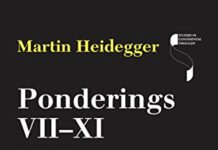
Ebook Info
- Published: 2016
- Number of pages: 389 pages
- Format: PDF
- File Size: 2.23 MB
- Authors: Martin Heidegger
Description
Ponderings II–VI begins the much-anticipated English translation of Martin Heidegger’s “Black Notebooks.” In a series of small notebooks with black covers, Heidegger confided sundry personal observations and ideas over the course of 40 years. The five notebooks in this volume were written between 1931 and 1938 and thus chronicle Heidegger’s year as Rector of the University of Freiburg during the Nazi era. Published in German as volume 94 of the Complete Works, these challenging and fascinating journal entries shed light on Heidegger’s philosophical development regarding his central question of what it means to be, but also on his relation to National Socialism and the revolutionary atmosphere of the 1930s in Germany. Readers previously familiar only with excerpts taken out of context may now determine for themselves whether the controversy and censure the “Black Notebooks” have received are deserved or not. This faithful translation by Richard Rojcewicz opens the texts in a way that captures their philosophical and political content while disentangling Heidegger’s notoriously difficult language.
User’s Reviews
Reviews from Amazon users which were colected at the time this book was published on the website:
⭐It’s hard to classify what kind of works the Ponderings (and others of Heidegger’s “Black Notebooks”) are. They are not just random notes — they are much more finished than that. As the editor (Peter Trawny) says in his Afterword, Heidegger did intend that they be published as the final pieces of his complete works. The individual entries are numbered, and there is running thematic unity. They seem more than anything an outlet for a style of writing and thinking that Heidegger was attempting, in keeping with his rejection of the current state of philosophical writing and the demands of “questioning being.”As an experiment in writing, I would definitely not recommend these notebooks as any kind of revealing meta-description of Heidegger’s otherwise obscure thoughts and writings. There’s no escaping the peculiar vocabulary and syntax (in any language) of Heidegger’s writing and thinking. These notebooks don’t explain anything in more common terms — as you’ll see below in my own tortured attempts to describe what he is thinking about here.This is the first volume, Ponderings II-VI (Ponderings I, the first of the notebooks hasn’t been located). They are dated 1931-1938. That places them after the publication and reception of Being and Time, and during the formation period for his later writings on art, poetry, and technology.One reason to read this volume in particular is that it covers the period of Heidegger’s involvement with Nazism, including his rectorship at Freiburg beginning in the Spring of 1933 (this is the time of Ponderings III, the second section of the book).Ponderings II introduces the theme that runs throughout all of these notebooks, the failure of philosophy (and contemporary culture) to ask “the question of being.” It’s difficult to characterize what Heidegger means by “the question of being” outside his own difficult vocabulary, but my own best understanding is that Heidegger is asking how it is that we have a world at all — what event or activity is it and how do we recapture it?Of course he isn’t asking about the scientific explanation of the origin of the world — science comes much too late in the game, with its methods and criteria for what counts as real or explanatory. Those methods and criteria are themselves dependent on that initial, primordial event of a world coming to be at all.Traditional philosophy, e.g., Kant’s question of what makes intelligible experience of the world possible, or even the questions that Heidegger himself asks in Being and Time about the structure of the everyday world, also come too late — they fail to reach back to the very basic question about where anything at all originates — how is it that there is any kind of world at all, and who are we/what is our role in that original happening of a world?Any question about the world — any question that takes place within the world, that doesn’t suspend all assumptions and “facts” — comes too late to understand what the activity of “worlding” itself is. Thus all traditional philosophy and all science come too late. Any terms in which you’d want to ask and answer the question — “experience”, “consciousness”, “object” or “objectivity” — are embedded within the framework of the world as already structured and present. They presume an answer without ever having discovered the question itself.Unlike Being and Time, Heidegger’s rhetoric here, and throughout this set of notebooks, is Nietzsche-like. He is making an historical call to philosophical action on the part of the community and the culture, certainly not just to philosophers per se. The problem is not, as you might think in Being and Time, a scholarly academic problem. He frames it here as an historical, cultural crisis.By losing our connection to this “worlding” or to “the question of being”, we have lost our ability to take our part in that activity. It’s not just that we don’t have the right account — that would just be a scholar’s problem. Instead, the problem is that we don’t know how to participate in that creative act that gives birth to a meaningful world. And that includes that we have lost our ability to participate in the making meaningful activity of our own world that we live in — it resides with us as a given, objective reality, “facts” without origin or grounding of meaning. It threatens a fall into meaninglessness.Ponderings III takes a distinct turn, presumably in keeping with Heidegger turning his attention to his rectorship at Freiburg, and to his role in National Socialism. I think the most distinctive theme running through his notes of that year of his rectorship is the possibility he sees for a rebirth of the German university, as generating with the youth to come a community of people who can ask the question he believes we have forgotten.One thing he does not see that reborn university as doing is serving the state. Rather this German university of the future will generate everything — the world — in which the state operates. Consistently, he also scoffs at the very idea of a National Socialist Philosophy — the proper role of philosophy is prior to any political thinking (he coins the term “metapolitics” here to help get across his point).He likewise rejects any kind of nationalism based on race or biology. Race and biology do not make the German people special — what would make a people special would be its readiness for the rebirth of the primordial thinking he believes to be the task of the moment.There is a necessary tension between Heidegger’s embrace of Nazism and his insistence that everything that does not reach back to “originary thinking” (“the question of being”) is part of the crisis German and world culture face.But the embrace is real, and we know of Heidegger’s active and energetic participation in the National Socialist Party. His embrace of Nazism seems rather based in his seeing in the German people and in the revolutionary energy of the Party, an opportunity for the rebirth of thinking that he believes necessary. His nationalistic fervor is based in Germany’s , and Nazism’s, historical position.We also see toward the end of Ponderings III Heidegger’s bitter disillusionment with that opportunity for the role of the German university. I think it would be an exaggeration to interpret his disillusionment as one with Nazism per se — really, it seems a disillusionment with the readiness of the German culture and institutional world for the renaissance he thought possible. The antibodies moved in on him, at least in his own experience of the failure. All interests are served by the status quo, and none are served by the kind of radical questioning he proposes. His radical plans for the university never take off.The failure might have been expected, in terms of his own thinking. Heidegger, like Nietzsche, speaks of himself as a “transitional thinker” — clearing the way for the radical questioning of being. He places himself at an historical inflection — when the “task” is given to us. As he says in Ponderings IV, “At issue is a leap into specifically historical Da-sein. This leap can be carried out only as the liberation of what is given as endowment into what is given as task.”The “endowment” he is speaking of is a lack of any sense that we have lost our connection to the original (“originary”) event of being, or of a world coming to be. We live in a settled world, with the only mysteries being the things we haven’t yet figured out but will get to as knowledge progresses on the path laid out for it. We have no sense of the mystery of the world, or even of our own loss of this primordial mystery of how a world happens.The “task” is then the recovery of this sense of loss and a rebirth of thinking. Heidegger’s characterization of the task as the “free mastery of the plight of a lack of a sense of plight” may or may not be especially helpful to you — with Heidegger, it is always a matter of trying to claw your way to a sense of what you think he is getting at.To get more feel for the “task” Heidegger is pointing to, it may be helpful to read some of Heidegger’s thoughts on the pre-Socratic philosophers, especially Anaximander, Parmenides, and Heraclitus. The “questioning of being” is alive in such thinkers. In his lectures on Parmenides (published as Parmenides), lectures on Anaximander and Parmenides (published as The Beginning of Western Philosophy) and in the Heraclitus Seminar, Heidegger tries to enter in a participatory way the thinking of those philosophers.Difficulties aside, I do think that reading these notebooks is helpful to trying to build an understanding of Heidegger’s thinking as he left the period of Being and Time and turned toward the later writings. In those writings emerge the roles of art and poetry as contributors to the kind of thinking he believes necessary. Those roles and themes become more and more explicit, as he leaves the vocabularies of traditional philosophy behind, along with the role of the professional philosopher, throughout the five notebooks here. Other essays written during the period (e.g., The Origin of the Work of Art in 1935-36 and What are Poets For? in 1936) focus on some of the same emerging themes.You also see themes that get detailed focus in much later writings (e.g., The Question Concerning Technology in 1954).Maybe it’s beyond saying by now, but this is not for casual reading. I think it best serves the purposes of someone taking on a very serious task of reconstructing the development of Heidegger’s thought during the 1930s, within the context of studying other writings and lectures.Despite some of the talk of how these notes reveal more about his participation in Nazism, I’m not all that sure they are especially useful for that. I don’t have the detailed knowledge of politics during the period to make a strong judgment — we’ll see what those who study Heidegger’s political life have to say.
⭐Splendid. What a brilliant mind. For me being existentialist it’s excellent because it moves in concentric circles about that line of reasoning most of the time. An ontology needs a soil to spring from, and this is a mastermind reasoning with itself. Astounding.
⭐Pleas see Gary Davis’ helpful reply to my post here.I’m sure the translation is fine and the material is important, but the editing for the Index is terrible. The Index, for example, says there is ONE occurrence of “Christianity,” but Amazon lists around 26. Moreover, on Amazon the page numbers on the left of “Look inside” do not always give you the page where the word occurs. However, when you click on the sample on the left, the text on the right opens to the correct page. A difficult book made much harder for scholarship. And “race” is not even mentioned in the Index — an important omission given the interest today in Heidegger’s anti-Semitism.
⭐I studied Heidegger at Boston College in the 1970s. It always appeared to me that the dark roots of Heidegger’s thought could be seen in several of his then extant works, especially in An Introduction to Metaphysics. That “authenticity” grounds DaSein seemed by necessity to render Heidegger’s thought easy prey to dangerous “nationalistic” movements which seek to “realize” or “rediscover” the nation’s essence. Heidegger asks: “What if…nations in their greatest movements and traditions are linked to being and yet had long fallen out of being,…and that this was the …central cause of their decline.” Nonetheless, Heidegger’s Nazi sympathies are not a reason to ignore Heidegger’s thought. Rather these sympathies expose the dark side of all similar modes of thought. When thought attempts to replace its society’s most cherished ideals with the “authenticity” of the day, that mode of thought, no matter how insightful, is inherently flawed. But keep in mind, all human thought is flawed. Yet even flawed thought, can embody great insight as Heidegger shows in “On the Question of Technology” and elsewhere.
⭐Very interesting digressions by an important philosopher and writer. Heidegger is also an amazing stylist, his writing as good as famous German novelists and essayists if not better than most of these. Much of this volume is concerned with the mindless march of technology in the modern age, of ‘lived experience’ and ‘success’ that has taken over thoughtful being and culture. Very prescient stuff. If you like careful, intelligent and insightful writing, forget what you have heard about Heidegger, the entries in this journal stand on their own as great literature.
⭐Good book and quick shipment
Keywords
Free Download Ponderings II–VI: Black Notebooks 1931–1938 (Studies in Continental Thought) in PDF format
Ponderings II–VI: Black Notebooks 1931–1938 (Studies in Continental Thought) PDF Free Download
Download Ponderings II–VI: Black Notebooks 1931–1938 (Studies in Continental Thought) 2016 PDF Free
Ponderings II–VI: Black Notebooks 1931–1938 (Studies in Continental Thought) 2016 PDF Free Download
Download Ponderings II–VI: Black Notebooks 1931–1938 (Studies in Continental Thought) PDF
Free Download Ebook Ponderings II–VI: Black Notebooks 1931–1938 (Studies in Continental Thought)




